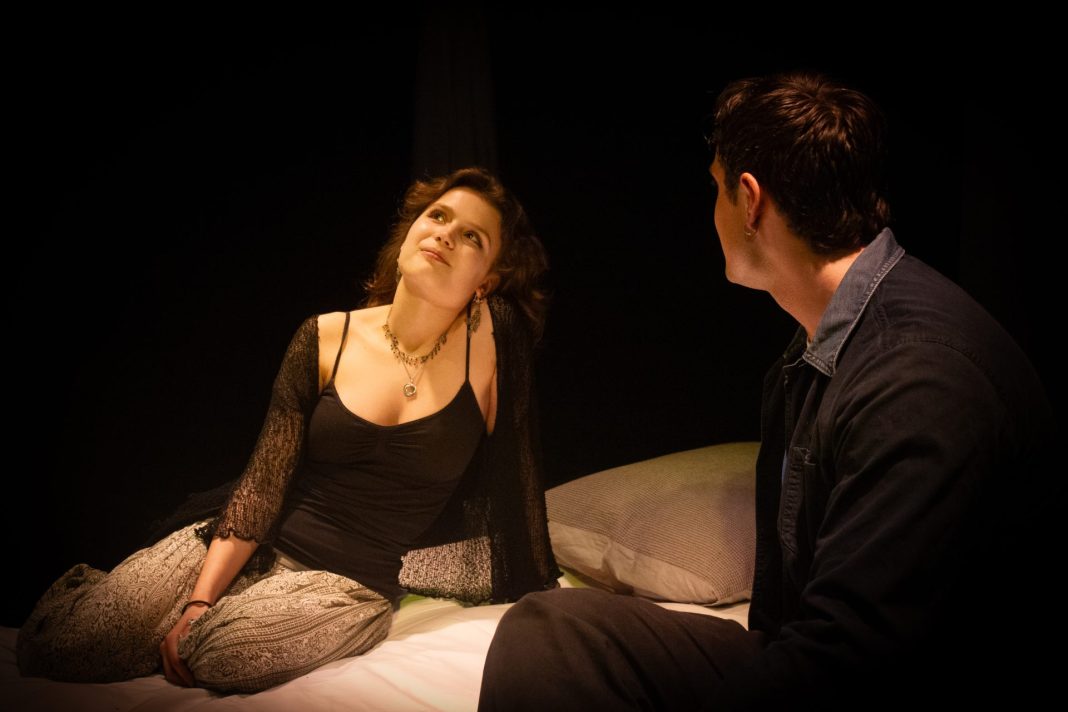There is a lot to like about Natascha Norton’s Crocodile Tears. Female lead Elektra Voulgari Cleare is both electric and effortlessly elegant, and male lead Flynn Ivo delivers a gripping performance that is both emphatic and earnest. I was particularly moved by the opening scene (on screen), where the chemistry between the actors felt piercing and palpable. The lighting, led by Felix Gibbons with assistance from Euan Elliott, masterfully blends the on-screen material with the real world, skilfully bridging the digital divide.
Indeed, I was drawn in by the multi-media nature of the production, a format that is both new to me, and to student production in Oxford generally. Norton and the Director Rosie Morgan-Males must be applauded for boldly taking an experimental approach to theatre, and the misgivings expressed here should not discourage them, or any aspiring artist from pursuing boundary-breaking experiences that challenge our conventional understanding of this ancient medium.
However, whilst I was impressed by the technological experience, I was at times distracted by the abrupt transitions between screen, stage, and sound. For example, within a single scene there would often be dialogue that is spoken, played, and shown on screen. Although this was an interesting idea, I wasn’t entirely sure why this decision was taken: why was it necessary for the actors on stage to suddenly stop speaking and for their dialogues to be played? For example, in one of the scenes where the characters were having an intensive dialogue about their relationship, the female lead suddenly stepped off the screen into real life in order to converse with her digital interlocutor. This transition took me out of the emotional elements of the scene, which were otherwise well done.
I was also puzzled by the themes of this production and the medium through which Norton had chosen to deliver it. Labyrinth Productions has frequently chosen plays which focus on questions of intimacy and relationships, having just come off a high-anticipated run a few weeks ago with the play Closer. Crocodile Tears is no different. The overriding conflict in the story was between two main characters – or perhaps I should say a lead and her supporting actor, as Cleare had significantly more stage time than Ivo – and the gradual breakdown of their relationship over an undefined period. It is therefore curious that Norton chose this techno-futuristic format to deliver this production, as it did not immediately seem clear to me what the added value of partially digitised dialogue is.
This choice reflects a broader trend in contemporary theatre towards digital integration. As Jesse Green wrote for the New York Times recently during the Tony awards, “virtual scenery reached critical mass on Broadway.” It is no secret that stage productions are increasingly adopting digital formats, often due to lower costs as well as to appear more modern. And modern this play certainly was, integrating amongst other things a dialogue between the female lead and ChatGPT. My misgivings about AI in theatre aside, I was disappointed by how the chatbot was used, as it produced generic sounding responses that could very easily have been spoken by a human (and not the sycophantic rant these models tend to give). And indeed, much more work could have gone into the sound engineering, as the films shown on screen were both too loud and too quiet at different moments.
Speaking to members of the audience after the production, many shared their confusion at the plot of the story, which was convoluted and fragmented: the relationship appears suspended in time, with neither a clear beginning nor a satisfying resolution, and the tensions in each scene was never resolved. Of course, I suspect that plot was not the focus for Norton in this production; the programme simply invites us to enjoy the ‘haunting soundscapes and Virginia Woolf-style lyricism.’ Ultimately, though, Crocodile Tears does too much of everything to fail at mastering anything, an admirable attempt at abolishing anachronism that ultimately ends in aimlessness.


